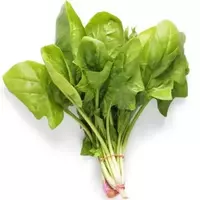Spinach

Persia is recognized as the birthplace of spinach. There he was considered the "king of vegetables" and a delicacy. It was from there that the triumphant procession of this plant began around the world after the Arabs introduced the Spaniards to it. After the discovery of America, spinach also got to where it became one of the most popular cultures in the diet.
In Russia, spinach is not so popular, but nevertheless, recently it can be found more and more often in the summer cottages of Russians. The wary attitude towards spinach appeared, apparently, because it does not have the pronounced taste that we are used to. In addition, spinach cannot be stored for a long time - it quickly loses its properties. But the beneficial properties of spinach are manifested in a great variety and variety, so that the inhabitants of Persia were not far from the truth, giving spinach the big name "king of vegetables. "
Spinach benefits
There is a huge amount of protein in spinach leaves, only beans and green peas can boast of large indicators. In addition, vitamins A and C, important for the body, are preserved even with long-term heat treatment of spinach. In addition, spinach includes vitamins E, H, K, PP, vitamins of group B. Spinach contains a good half of the elements from the Mendeleev table: calcium, potassium, sodium, magnesium, iron, phosphorus and many others. Carotene is so much here that the leading position in its content, spinach is second only to carrots.
Spinach not only fills the body with useful substances, but also contributes to the elimination of slags and toxins. Thanks to spinach, cells are more actively filled with oxygen, it helps to improve metabolism, increases overall tone. For people whose lifestyle involves stressful situations, spinach helps to restore mental balance, increases performance. Eating spinach prevents the development of anemia and tumors, strengthens the walls of blood vessels, stimulates the normal work of the pancreas and intestines. Iodine, which is found in spinach, has an extremely beneficial effect on the thyroid gland and is shown to people who have problems with this most important organ.
The presence of almost all nutrients necessary for human health makes spinach simply indispensable in the nutrition of pregnant women and young children. At the same time, spinach is perfectly absorbed, unlike many other vegetables with a green color, does not cause irritation of the mucous membrane.
Spinach is very often included in the diet as a dietary product, as it has a mild diuretic, laxative, anti-inflammatory and, as already mentioned, tonic, effect. The calorie content of spinach is 22 kcal. per 100 gr.
Spinach harm
The benefits of spinach are in its composition, but, as usually happens, the harm of spinach lies in it. Namely, in the presence of oxalic acid, which is contraindicated in people with peptic ulcers, as well as with diseases of the kidneys and urinary system. In this case, according to experts, the use of spinach should be limited.
spinach 23 kCal
Energy value of spinach (Ratio of proteins, fats, carbohydrates - ju):
Proteins: 2.86 g (~ 11 kCal)
Fats: 0.39 g. (~ 4 kCal)
Carbohydrates: 3.63 g (~ 15 kCal)
Energy ratio (bj | y): 50% | 15% | 63%
 Español
Español Français
Français Português
Português Русский
Русский 简体中文
简体中文 繁體中文
繁體中文 日本語
日本語 한국어
한국어 العربية
العربية Türkçe
Türkçe Қазақ
Қазақ Deutsch
Deutsch Italiano
Italiano Українська
Українська
